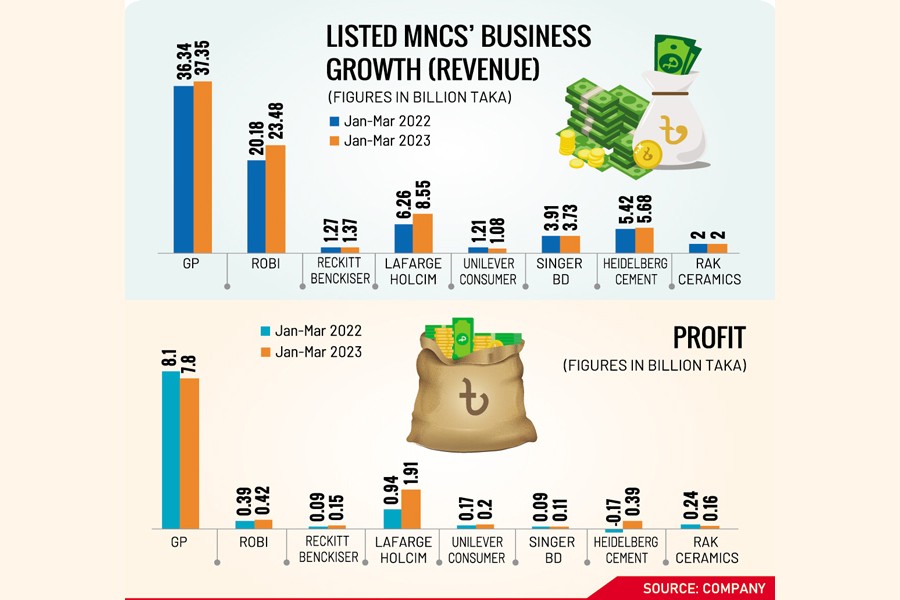Most multinational cos show signs of strong recovery in Jan-March

Published :
Updated :

Most listed multinational companies posted higher profits in the first quarter of this year compared to the same period last year on the strength of managerial efficiency, brand value, and product price hike.
The businesses performed better despite raging inflation that squeezed people's purchasing power.
Brand value and quality of products are two major factors that kept the demand strong for the products manufactured by these companies, market operators say. And they are well known for good governance and management.
Thirteen multinational companies listed in the stock market account for 13 per cent market cap of the Dhaka Stock Exchange.
Earnings of six, out of eight that published their first quarter reports, increased between 5.5 per cent and 102 per cent year-on-year in January-March.
Eight companies altogether logged about Tk 11.14 billion net profit in the quarter through March, which is a 13 per cent increase from the same quarter a year ago, according to their unaudited financial statements.
Of those, consumer goods manufacturers saw demand for their products remain relatively the same while those in construction sector recorded higher revenue.
Cement maker LafargeHolcim's profit more than doubled year-on-year to Tk 1.91 billion in the first quarter ended in March, backed by what it said is new products and innovative building material solutions.
The sales revenue also jumped 37 per cent year-on-year to Tk 8.54 billion in the quarter.
The quarterly performance shows, "the strength of our diverse product portfolio" and "high-value solutions, digital footprint and new [business] channels," said Iqbal Chowdhury, chief executive officer of LafargeHolcim Bangladesh.
LafargeHolcim has a unique edge in business as it depends on its own source of the core raw material. The advantage creates an opportunity to avoid freight charges and escape international raw material market volatility, which helped quarterly profit jump.
Another multinational cement maker, Heidelberg that markets its product in the brand name of Scan Cement rebounded strongly in January-March after enduring losses for five consecutive quarters.
The cement maker registered a profit of Tk 387 million in the three months through March while it counted Tk 168 million in loss in the same quarter the year before.
It reaped benefits as raw materials' prices started cooling down in the global market since October last year. At the same time, the selling prices of cement on the retail market rose about 10 to 15 per cent, which also helped overcome losses, said an official of the company.
Reckitt Benckiser (Bangladesh) PLC posted a 67 per cent year-on-year growth in profit in the Jan-March quarter, thanks to a significant reduction in operating expenses.
The UK-based multinational firm that sells popular consumer products, Dettol and Harpic for example, gained a profit of Tk 152 million in the first quarter.
The sales revenue was up 7.22 per cent year-on-year while the cost of production jumped 12 per cent during the quarter.
The management of the company brought down the operating costs by reducing marketing expenses, which led to higher profit, said company secretary Md Nazmul Arefin.
Reckitt's operating cost shrunk by 17 per cent while marketing expenses dropped more than 36 per cent to Tk 149 million in the quarter until March.
Unilever Consumer Care, a part of Unilever Group of companies, also saw 17 per cent year-on-year surge in profit to Tk 201.35 million in the first quarter despite a 10.6 per cent drop in the sales revenue due to high inflation.
Operating efficiencies, higher net finance income, and one-off benefit from a reassessment of past liabilities helped the multinational consumer goods company to boost earnings.
The sales revenue of the Horlicks manufacturer fell owing to the inflationary pressure.
Singer Bangladesh reported a 24 per cent year-on-year growth in profit for the first quarter as it offset some of the costs by increasing products prices.
The company's turnover, however, dropped 4.40 per cent year-on-year to Tk 3.70 billion in the first quarter.
Robi Axiata, the second largest mobile phone company, posted a 5.52 per cent year-on-year profit rise to Tk 420 million for January-March, backed by higher revenue.
However, higher costs of revenue generation and foreign exchange loss kept Robi's profit from growing at an expected rate, said the company.
The taka becoming cheaper against the dollar multiplied the company's foreign exchange loss by 7.3 times year-on-year to Tk 756 million during the quarter ended in March.
Despite the loss, overall revenue increased 16 per cent year-on-year to Tk 23.48 billion in the three months, riding on voice and data revenue growth.
Of the multinational companies, Grameenphone and RAK Ceramics suffered de-growth in profit.
The leading telecom operator invested hugely during the quarter to bolster its fibre connectivity, which, it said, will accelerate its growth in future.
The company invested Tk 6.90 billion in the quarter, about 76 per cent higher than in the same period a year ago, on building 4G network, coverage expansion and spectrum deployment.
"This lays the foundation for a future-ready data network that provides seamless connectivity across Bangladesh, delivering a superior network experience for the customers and building the number one network in the country," said Yasir Azman, chief executive officer of Grameenphone.
RAK Ceramics' (Bangladesh) profit plunged 35 per cent year-on-year to Tk 156.49 million in the quarter, owing to the energy price hike and the volatile foreign exchange market that caused higher cost of inputs.
The company's sales revenue was unchanged at Tk 2 billion, compared to the same quarter of the previous year, but the cost of sales rose 6.33 per cent.
babulfexpress@gmail.com


 For all latest news, follow The Financial Express Google News channel.
For all latest news, follow The Financial Express Google News channel.